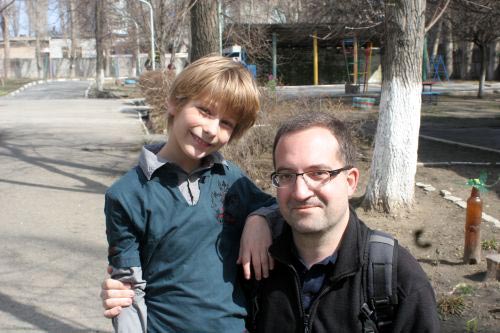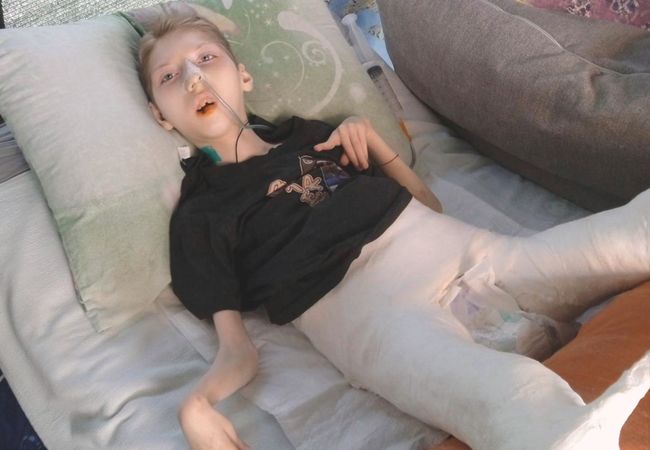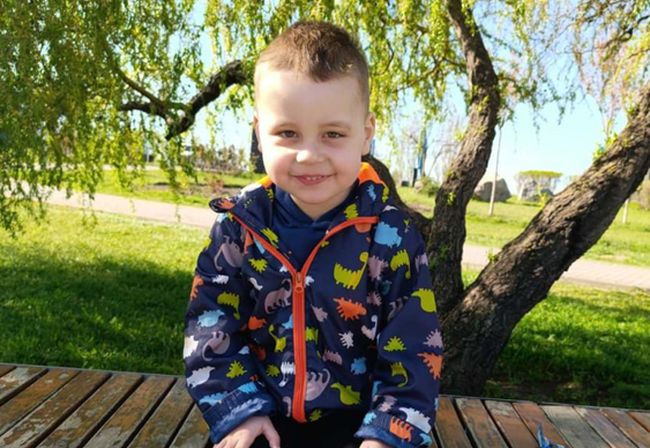
Photos provided by the author of the article, Andrey Glushshenko and the personal archive of the heroes of the article
The statement that “There are many kind people all around the world” does not really cause a sensation anymore, but still sounds very encouraging. There are many couples from all corners of the world who are willing to adopt an abandoned Ukrainian child. However, truly speaking, the number of such “willing” adoptive families has noticeably decreased. This result is deliberately driven by the policy of the Ukrainian Parliament, which is faithfully guiding the Ukrainian genofond from foreign invaders. The Ukrainian government, however, did not take into account several details in conducting this policy. It costs a great deal of money from the state budget to take care of little Ukrainian orphans.
The ReporterUA correspondents decided to clear up this issue, so they met with supporters and opponents of foreign adoption in Ukraine. They all told us why some little orphans from Zaporizhzhia are diagnosed with autism as soon as they get adopted abroad, why Americans adopt children with Down Syndrome and how these adopted children become fashion accessories at the parties of foreign adoptive parents.
Little children adopted from Zaporizhzhia are keeping silence abroad
According to the head doctor of the “Solnyshko” (Little Sun”) Child’s Home in Zaporizhzhia Galina Galkina, the foreign adoption process in Ukraine is getting more and more complicated every year.

This issue is strongly connected with the policy of Verkhovna Rada (the Ukrainian Parliament) that urges raising children in their motherland. That’s why the number of foreign adoptions has decreased by nearly three times. Nowadays Ukrainians prefer becoming foster parents. The concept of “foster parents” is often confused with “adoptive parents” by many people in Zaporizhzhia. The main difference between foster parents and adoptive ones is that foster children keep their orphan status as well as original name and surname. Although such foster parents can adopt their foster child in future, the general statistics are rather unimpressive. Just take a look, a year ago happy foster parents took 170 children home, nowadays this figure is reduced to 57.

The main reason for such a dramatic decrease in foreign adoptions is new Ukrainian laws. Now moms and dads from abroad may adopt Ukrainian children only if the child is at least five years old and has been on record with the local executive authority for at least a year. An exception may be made only if foreign parents are relatives of a child, he\she is diagnosed with an illness that is acknowledged by the Health Care Ministry of Ukraine or if foreign parents want to adopt siblings (also on condition one of children reached the appropriate age and has been on the record for a year). Foreign parents may also adopt a child if they previously adopted his\her brothers or sisters. There is one “but” however…
“Ukrainians as well as foreigners want to adopt a child who’s younger than one year old or even six months old,” – says Galina. No one considers the fact that a five-year-old child already suffers from a language barrier. This may also cause such a disorder as autism. There was a case when an adopted child from Ukraine stopped speaking at all upon living with his new foreign family. Moving to another country is a serious psychological trauma and life change. This fact should have stopped the Ukrainian government from issuing this age category.
The second problem connected with the new rules is faced by health care institutions (especially the “Solnyshko” Child’s Home). Namely, the treatment of little orphans of the Child’s Home (30% of whom are children with special needs) is financed by the state. This treatment could be ideally financed by adoptive parents.
What’s more, it’s much easier for a foreigner to adopt a child in Ukraine than at home due to the large number of social orphans in our country. Whereas abroad one can mostly adopt biological orphans (whose parents died).

“We don’t like to speak about financing children in orphanages, but the state spends huge amounts of money for surgeries and rehabilitation of these children and then bringing them in order by the time they turn five years old”, - notes Galina. “If our little ones were adopted by foreigners, they would be treated at the expense of their new parents. Besides, Ukrainians would never adopt such children. But it is not as easy as it seems at first glance”.
A little child adopted from Zaporizhzhia is like a fancy puppy abroad
Victoria Mochalova, a coordinator of a family arrangement of orphans in the “Happy Child” Charity Foundation believes that the goals of foreign adoptive parents can be very different. For instance, in some countries it’s almost fashionable to adopt kids from exotic countries like Ukraine. That’s why there are many mixed families consisting of Afro-Americans, Asians and Slavs. The statement that foreigners dream of adopting Ukrainian children with disabilities is rather a myth. Like Ukrainian “families” they also want to have a healthy heir. Apart from that, not all the children adopted from Ukraine manage to settle down there successfully.
There’s a life example about a boy from Zaporizhzhia who was adopted by an American children’s writer.

“She took this boy like a fancy puppy”, - says Victoria. “And she wrote about his upbringing in her blog. But she totally forgot about the boy’s existence at social parties. Consequently, the boy decided to come back to the orphanage in Ukraine.”
To top it all, the boy was already fifteen years old by time he returned, which meant he was unlikely to be adopted again.
Unfortunately, foreign adoptive parents do not have an opportunity to attend any special parents’ courses. Such practice is only common for foster parents who can be Ukrainian citizens.
Nevertheless, many foreigners take Ukrainian orphans for health resort holidays abroad. Such vacation travels, however, do not often bring much benefit.
Victoria Mochalova has witnessed such situations when Ukrainian orphans start considering themselves ancestral princes and princesses after their coming back from their holidays abroad, and, thus, refuse to be adopted by potential Ukrainian families. They end up staying at the orphanage and without any place to live after their school graduation.
Victoria is of the opinion, that instead of promoting foreign adoption, the Ukrainian government should better pay more attention to the preservation of biological families. But the problem is no real mechanism for family preservation has been developed yet.
Another problem for domestic adoption is the Soviet stereotypes many Ukrainians still often have. One of these is that one can only adopt a child if one does not have children of his or her own. Fortunately this stereotype is fading from Ukrainian society. There are more and more families in Zaporizhzhia ready to welcome a little orphan into their home.
There are some very positive examples of foreign adoption however. Several months ago for the first time in the history of the Child’s Home in the village of Kalinovka for severely disabled children, an American couple from South Carolina adopted Sasha. The family of an American pastor has probably adopted Sasha since there’s a special program for children with Down Syndrome in the US.

As the charity foundation employees told us, soon after Sasha’s adoption, his new father Shane Robertson uploaded a video of the boy on his social network. His video comment was “Just a month ago Sasha was almost dead, but now he is crawling about and playing in his loving family”. Sasha’s biological mother abandoned him right away after his birth.
A Foreign Adoptive Parent is a Philanthropist
ReporterUA correspondents managed to find the last of the Mohicans – a German named Robert Eidenschink who has recently adopted a child from the “Sonlyshko” Child’s Home (he does not have his own biological children). His adoption in Ukraine has also resulted in setting a charitable foundation in Germany that is focused on helping orphans and severely sick children from Zaporizhzhia. Robert is far from being a multimillionaire – he works as an ordinary math teacher at one of German schools. He is an active advocate of charity there as well.

Robert together with little dwellers of the “Solnyshko” Child’s Home
“There is a special wall newspaper in our school where one can always read about teacher’s leisure time activities”, - tells us Robert. “There is some information about my activities in Ukraine. Although mathematics is an important subject, our school newspaper also publishes the contact details as well as pictures of the “Solnyshko” Child’s Home.
Robert founded a community in Aschaffenburg that consists of 146 members who make some yearly donations. This donated money goes to the “Solnyshko” Child’s Home, Matveevka Orphanage and to a community of large families of Zaporizhzhia. They have mutually managed to raise more than one hundred euros for all this time.
Robert has visited our city seven times. Every visit lasted for 8-10 days. This kind tradition got established since his family adopted his new member – an orphan from Ukraine Vanya. The boy got his name in Ukraine and stayed a namesake of the famous Russian writer Anton Chekhov. In his new German ID the boy is now stated as “Vanya” instead of a traditionally common formal full name” Ivan”.

Robert and Vanya
Galina Galkina is sure that little Vanya is lucky. Like most of the children of the “Sonyshko”, Vanya’s health problems would sooner or later bring him to an orphanage. What’s more, Vanya is an exception to the rule since sick children are rarely adopted by Germans, Canadians or French. There were only three children adopted by Canadians and around ten children by Germans for the whole history of the “Solnyshko” Child’s Home. That’s why Vanya became one of the last children in Zaporizhzhia on the foreign adoption list.
One of our correspondents had a little conversation with Vanya during his stay in Zaporizhzhia (the boy always travels with his dad to Ukraine). Vanya is nine years old now. When he was asked what he liked most of all in Zaporizhzhia, he naively replied, “One can often see money on your streets. Besides, your children are very good. Children in Germany are more selfish. They are not so generous and never feel like sharing things with each other”.
Robert told us that his son attends the fifth grade, plays the piano and goes swimming once a week. Vanya also supports his father’s charity activity outlook. From time to time there are some informational markets at Vanya’s school where the boy gives out fliers with the donation details of the “Solnyshko” Child’s Home in Zaporizhzhia.
What should foreign adoptive parents expect from their Ukrainian adopted children?
At the beginning of the adoption process, Robert had many issues to solve.
“When I was at the Kyiv Adoption Center, I was first offered to adopt a child from Kherson”, recollects the German adoptive father. “But that child was extremely ill; he had no kidneys. Therefore, the child needed 24-hour care and treatment. That’s why I asked for another child. Then I was shown a picture of Vanya. He was really little there. When we arrived in Zaporizhzhia we saw how much this boy grew up. He ran towards me and shouted “Papa!” That’s how everything started.
The main challenge the German adoptive parents had to face was the language barrier. This was not the only reason for incomprehension though.
“There is a big difference between waiting for your own child for nine months and accepting an adopted child the way he\she is. In the second case, one never knows what one can expect”, reflects Robert.
It is surely easier to adopt in Ukraine than to spend 2-4 years in anticipation at home (this is the period of time Germans have to wait till they can adopt children in Germany).
Robert is not hurrying to adopt another child yet. There are still many difficulties with their first adopted son. Robert was willing to adopt Vanya’s brother, but an adoptive family from Tel Aviv, the Israeli capital, claimed to be the first to adopt the boy. The brothers do not keep in touch since the Israeli family tries to isolate their adopted boy from his Ukrainian roots. Robert has an opposite approach though. That’s why Vanya even knows some Russian words like “tapochki” (slippers) and “khleb” (bread).
Robert told us why he visits us and the most important why he helps our orphans.
“When I first came to Zaporizhzhia I was shocked about the local culture and bureaucracy. Such lawsuits are completed much faster in Germany. We have a good life in Germany. It’d be great if I can improve lives of little orphans in Zaporizhzhia a bit”.
The money matter
According to unofficial statistics an average orphan in Ukraine costs European adoptive parents some thousands euros. These sums of money go to mediators instead of the state budget. This adoption procedure is officially free of charge though. Therefore, our so-called grey orphans’ market hinders potential foreign parents from adopting Ukrainian children.



